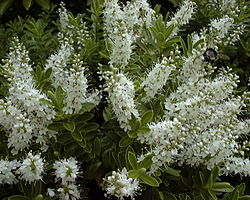| Veronica rakaiensis | |
|---|---|
 | |
| In bloom | |
| Scientific classification | |
| Kingdom: | Plantae |
| Clade: | Tracheophytes |
| Clade: | Angiosperms |
| Clade: | Eudicots |
| Clade: | Asterids |
| Order: | Lamiales |
| Family: | Plantaginaceae |
| Genus: | Veronica |
| Section: | Veronica sect. Hebe |
| Species: | V. rakaiensis |
| Binomial name | |
| Veronica rakaiensis J.B.Armstr. | |
| Synonyms [1] | |
| |
Veronica rakaiensis, the Rakai hebe, is a species of flowering plant in the family Plantaginaceae, native to the South Island of New Zealand. [1] As its synonym Hebe rakaiensis it has gained the Royal Horticultural Society's Award of Garden Merit. [2]